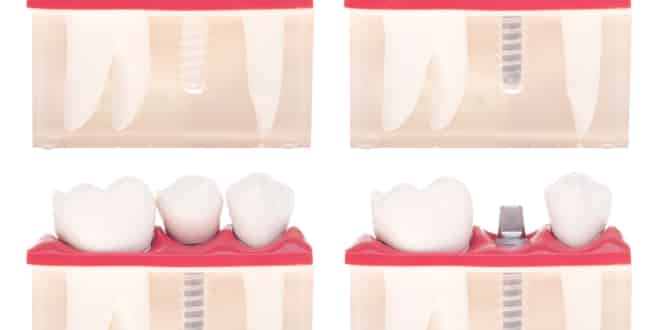Getting dental implants is a big decision. And when it comes to dental procedures of any kind, it’s important to be fully informed about what it is you’re getting before committing to the treatment.
So to help you understand exactly what it is you’ll be getting from your dental implant, we’ve put together a list of five commonly asked questions about the procedure.
1) What are dental implants?
Ok so let’s start with the basics. Dental implants are artificial titanium roots specifically designed to replace missing teeth. They are a great way to complete your smile as they are safe, stable and allow for the comfort of chewing.
Titanium is used because it’s a strong and save material which allows the bone can grow around. These implants are carefully placed in to the jaw bone so that the replacement tooth stays in place.
2) Should I get a single tooth implant, a bridge or dentures?
The answer to this question will of course depend on a variety of factors such as how many teeth are missing. But when it comes to replacing a single tooth, a single tooth implant provides a permanent replacement which looks and feels natural.
Dentures can often feel bulky and comfortable and a tooth supported bridge must be attached to other teeth in order to maintain its stability. A single tooth implant remains stable without affecting or grinding down on the other teeth on either side and exposing them to risk of damage.
If you are missing multiple teeth, many dentists will suggest dentures, but as we’ve already discussed these can be bulky and uncomfortable. Much like single tooth implants, multiple tooth implants are also possible and can help keep that natural look and feel.
It’s also worth noting that out of the various procedures currently available, dental implants are the only tooth replacement option that actively prevents bone loss and helps stimulate bone growth.
3) When should I get dental implants?
If you leave empty spaces in your mouth for a long time after losing one or more teach, you are opening yourself up to a number of risks. You could experience jawbone deterioration or increase the risk of a number of infections.
It’s therefore best to get dental implants as soon as possible after losing a tooth or multiple teeth in order to prevent bone loss at the site.
4) Can my kid get dental implants?
Dental implants should only be inserted once a person’s facial growth and development has been completed. Children’s mouths and jaws are continuously growing and changing and it’s not safe to give them dental implants until their jaws have hardened complete. This can occur around age 16 in girls and age 18 with boys but many people’s jaws are still growing until their early twenties.
Putting dental implants into a child’s mouth before their jaw is fully grown can cause all sorts of issues. As the child’s jaw grows, it can shift the implant out of place which can cause crookedness, pain and much more in their healthy and permanent teeth.
There are however other options for children such as a dental bridge or removable partial dentures. These are both viable options that can be used until the child is of an appropriate age to explore the option of dental implants.
5) How long do dental implants last?
When cared for and maintained properly, dental implants can last decades. Other options such as dentures and bridges usually last between five and ten years and therefore need a lot more maintenance (which also costs money).
Conclusion
So there you go. Answers to some of the most common questions about dental implants. For more information and to explore all your options in detail, contact a reputable and experienced dentist for a consultation.
Craig Evans is a Founder & Author for Curious Vision
Liked this article? Share it to say “thanks!” Your support is much appreciated!







